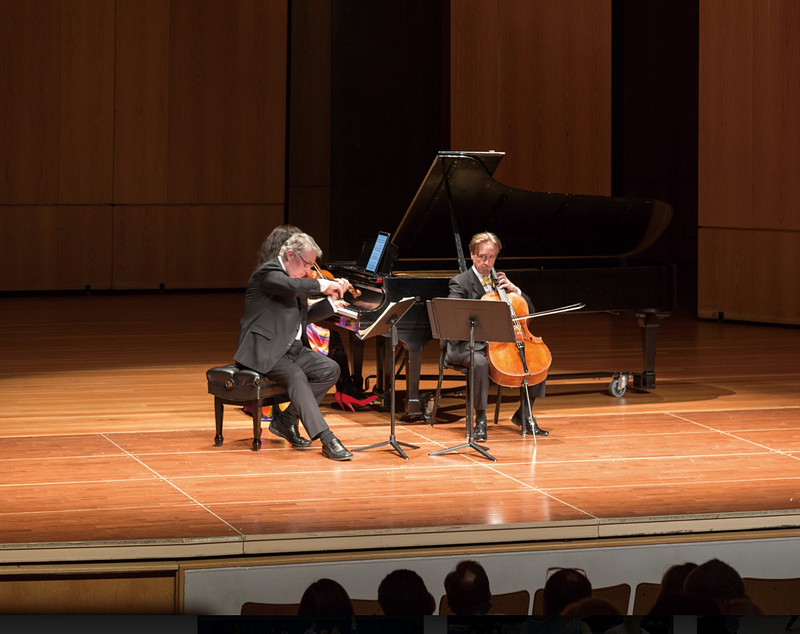
On Friday, Feb. 23., pianist Wu Han, violinist Philip Setzer, and cellist David Finckel performed for a crowd of Hamilton students, faculty, and local community members in Wellin Hall.
Wife and husband Wu Han and David Finckel have taken the chamber music world by storm. Han grew up in Taiwan and moved to America in 1981 to study piano and viola. In addition to her career as a performer, Han is currently the co-Artistic Director of the Chamber Music Society of Lincoln Center.
David Finckel was the cellist for the Emerson String Quartet from 1979 to 2013. Finckel won nine Grammy awards for his work in this quartet. Han and Finckel have been touring the world since the early 1990s, and are now one of the most popular piano-cello duos in classical music. In 2012, Musical America awarded the duo with its Musicians of the Year award, one of the highest accolades in the music industry.
The two often perform with close friend and colleague, violinist Philip Setzer. Setzer was in the Emerson String Quartet with Finckel and still plays with the group. Additionally, he is a Professor of Violin and ChamberMusic at SUNY-Stony Brook.
Han began the night by addressing the audience and giving background information on the evening’s program. Han, Setzer, and Finckel played two piano trios: Beethoven’s Piano Trio in B- at major, Op. 97, “Archduke,” and Schubert’s Piano Trio in E- at major, Op. 100, D929. Friday night’s program noted, “The ‘Archduke’ Trio is named for the Archduke Rudolph: the younger brother of Emperor Leopold II, a patron and sometime student of Beethoven’s, and recipient of the Trio’s dedication. Beethoven played in the Trio’s premiere, and this performance turned out to be one of Beethoven’s last few public performances, due to his worsening deafness.” Han, Setzer, and Finckel performed all four movements of “The Archduke Trio.” The piece was soothing yet playful, with lots of back and forth between the instruments, making it sound like a conversation, not just a performance.
The Schubert piano trio contrasted the mood of the Beethoven piano trio, yet the two were highly connected. As the program notes said, “Schubert’s particular pride in the E- at is evidenced by his inclusion of it as the centerpiece on a program of his own music on 26 March 1828, commemorating the first anniversary of Beethoven’s death. The shadow of Beethoven is significant, not only for his profound influence on Schubert on the whole, but also for his own granite essays in the piano trio genre. Indeed, there may be no higher compliment than Robert Schumann’s regard for Schubert’s Opus 100 as equal to Beethoven’s formidable ‘Ghost’ and ‘Archduke’ Trios.” Again, the group performed all four movements of Schubert’s piano trio.
The audience not only picked up on the trio’s beautiful musical abilities, but also their passion, energy, and focus. After the concert, audience member Genny Cohen ’21 said: “You could tell that all three of them had a specific image in their mind that they were all trying to create for the audience because they were all cuing each other and playing off of each other’s energy.”
Overall, Han, Setzer, and Finckel’s performance was wonderful and well received. See last week’s issue of
The Spectator
for an exclusive interview with Han on her career and her then upcoming performance at Hamilton.

















